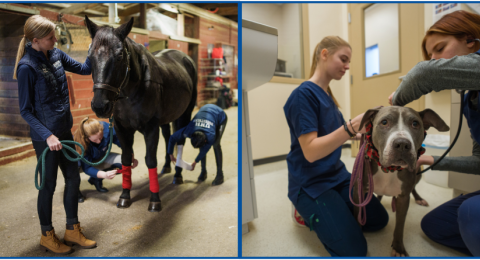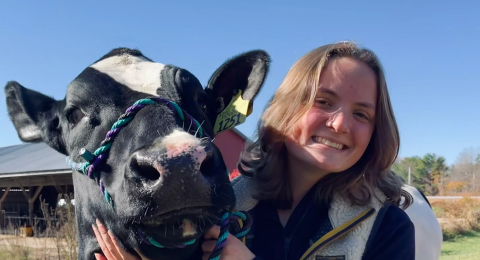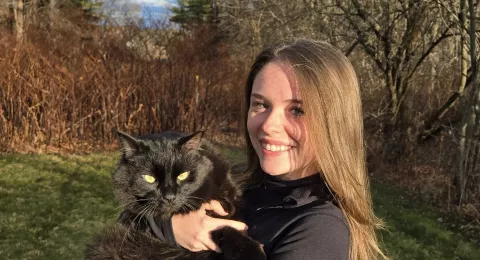Train to become an animal nurse and qualify to become credentialed in our American Veterinary Medical Association-accredited program.
About the Veterinary Technology program
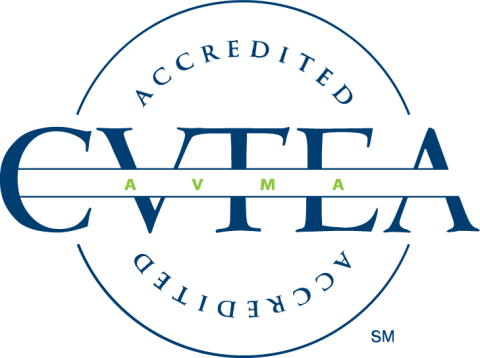
What is veterinary technology?
Veterinary Technology prepares students to become credentialed veterinary technicians, essential members of the veterinary healthcare team. Veterinary technicians are educated in the care and handling of animals, the basic principles of normal and abnormal life processes, and in many laboratory and clinical procedures. Veterinary technicians work under the supervision of licensed veterinarians. While they can carry out a broad range of tasks, they are not authorized to diagnose, prescribe, or perform surgery. Students can continue with post-graduate specialization in areas such as anesthesia, behavior, dentistry, and emergency medicine.
Why study veterinary technology at UNH?
The Veterinary Technology program at UNH is accredited by the American Veterinary Medical Association (AVMA), preparing graduates to take the Veterinary Technician National Exam and pursue credentialing. The program is highly hands-on, with students working with animals from the very first day. UNH offers exceptional access to large animals, including equine and dairy herds on campus. Small animal clinical work is conducted both on campus at the PAWS Veterinary Clinic and off campus at local animal shelters. After earning an associate degree in Veterinary Technology, qualified students can transfer to the university’s four-year Animal Science major and complete a bachelor's degree in two additional years of full-time study.
Potential Careers
- Animal rescue/shelter and welfare organizations
- Diagnostic laboratories
- Pharmaceutical research/sales
- Private veterinary practices
- Public health/government (USDA, FDA, CDC)
- Specialty fields (emergency, surgery, anesthesia, dentistry, cardiology, etc.)
- Teaching and education
- Telemedicine and virtual care
- Wildlife and marine mammal care
- Zoo and aquarium work
Curriculum & Requirements
The primary goal of the veterinary technology program is to provide students with exceptional technical and clinical reasoning skills and knowledge in veterinary technology such that graduates will be prepared to pass the Veterinary Technician National Exam (VTNE) and to be immediate and valuable members of a veterinary medical team. Additionally, the program aims to develop a firm foundation in both farm animal and companion animal veterinary practices. Courses in the program cover basic sciences, veterinary nursing, and veterinary practice management, with a strong focus on hands-on practical knowledge throughout the curriculum. Students gain basic knowledge and skills for the major domestic animal species (dog, cat, horse, and cow). Integration of knowledge in communication, veterinary ethical and legal issues, veterinary practice management, clinical reasoning skills, and hands-on technical skills allow students to become complete veterinary technicians, capable of providing high-quality, compassionate, and expert care to animals both small and large.
Practical learning experience is provided at the PAWS Veterinary Teaching Clinic, the UNH Equine Facilities and the Thomas P. Fairchild Dairy Teaching and Research Center. The program has a number of animal-related educational partnerships, including those with the New Hampshire SPCA in Stratham, N.H., and the Pope Memorial Humane Society of Cocheco Valley in Dover, N.H.
The program is accredited by the AVMA. Students who graduate from an accredited program are eligible to take the Veterinary Technician National Exam (VTNE) and pursue credentialing.
Sample Degree Plan
This sample degree plan serves as a general guide; students collaborate with their academic advisor to develop a personalized degree plan to meet their academic goals and program requirements.
| First Year | ||
|---|---|---|
| Fall | Credits | |
| AAS 428 | Anatomy and Physiology of Domestic Animals | 4 |
| CHEM 411 | Introductory Chemistry for Life Sciences | 4 |
| ENGL 401 | First-Year Writing | 4 |
| VTEC 424 | Introduction to Veterinary Technology | 2 |
| VTEC 430 | Companion Animal Behavior and Handling Techniques | 4 |
| Credits | 18 | |
| Spring | ||
| VTEC 435 | Animal Health and Laboratory Diagnostics | 4 |
| VTEC 449 | Clinical Animal Nursing Techniques I | 4 |
| VTEC 565 | Pharmacology for Veterinary Technicians | 4 |
| Quantiative Reasoning | 4 | |
| Credits | 16 | |
| Second Year | ||
| Fall | ||
| AAS 421 | Large Animal Behavior and Handling Techniques | 2 |
| VTEC 497 | Veterinary Technology Work Experience | 0 |
| VTEC 550 | Clinical Animal Nursing Techniques II | 4 |
| VTEC 575 | Veterinary Anesthesia and Surgical Assisting | 4 |
| VTEC 579 | Small Animal Practicum I | 4 |
| Credits | 14 | |
| Spring | ||
| VTEC 580 | Small Animal Practicum II | 4 |
| VTEC 583 | Large Animal Practicum | 2 |
| VTEC 595 | Veterinary Technology Internship | 3 |
| VTEC 599 | Comprehensive VTNE Review | 4 |
| Social Science | 4 | |
| Credits | 17 | |
| Total Credits | 65 | |
Degree Requirements
Major, Option, and Elective Requirements as indicated.
*Major GPA requirements as indicated.
Veterinary Technology Requirements
Students must demonstrate all of the following for retention in and completion of the veterinary technology program:
- Courses must be completed in proper sequence, according to pre-requisites listed in the course catalog.
- To progress in the program, students must:
- Earn a minimum of 70% on their exam average in each VTEC course.
- Earn a minimum of 80% on their skills grades in VTEC 579 and VTEC 580.
- Receive a minimum grade of C+ (2.33 grade point) or better in all required AAS and VTEC courses.
- Students who fail to meet retention requirements after 3 semesters will not be allowed to progress further in the program until retention requirements have been met.
- Students are allowed to repeat any major course once. If the student does not meet the grade standard on the retake, they must repeat the class again before taking other major courses.
- Students are allowed to repeat no more than two major courses.
- Students who fail to meet program grade standards in a third course will not be allowed to proceed in the program.
- Students must maintain a 2.5 GPA in major courses to take additional courses in major.
- Students must have a minimum cumulative 2.5 GPA in major to qualify for graduation from the program.
- Students must successfully complete all required skills listed in the Veterinary Technology Essential and Recommended Skills List developed by the AVMA (the accrediting body for this program).
- All coursework in the veterinary technology curriculum should be completed within five years of initial program enrollment. If this cannot be accomplished, the student may be required to reapply to the program for a new admission status and all veterinary technology specific courses may have to be repeated.
Students must show proof of pre-exposure rabies immunization or adequate rabies titer prior to enrollment in the program. Transportation is provided to students for practicum coursework. Students are responsible for providing their own transportation during internship experiences.
| Code | Title | Credits |
|---|---|---|
| Required Courses | ||
| AAS 421 | Large Animal Behavior and Handling Techniques | 2 |
| AAS 428 | Anatomy and Physiology of Domestic Animals | 4 |
| CHEM 411 | Introductory Chemistry for Life Sciences | 4 |
| VTEC 424 | Introduction to Veterinary Technology | 2 |
| VTEC 430 | Companion Animal Behavior and Handling Techniques | 4 |
| VTEC 435 | Animal Health and Laboratory Diagnostics | 4 |
| VTEC 449 | Clinical Animal Nursing Techniques I | 4 |
| VTEC 497 | Veterinary Technology Work Experience | 0 |
| VTEC 550 | Clinical Animal Nursing Techniques II | 4 |
| VTEC 565 | Pharmacology for Veterinary Technicians | 4 |
| VTEC 575 | Veterinary Anesthesia and Surgical Assisting | 4 |
| VTEC 579 | Small Animal Practicum I | 4 |
| VTEC 580 | Small Animal Practicum II | 4 |
| VTEC 583 | Large Animal Practicum | 2 |
| VTEC 595 | Veterinary Technology Internship | 3 |
| VTEC 599 | Comprehensive VTNE Review | 4 |
| Total Credits | 53 | |
Discovery Program Requirements
Students must complete 20 credits within the Discovery program; with at least one course in the following categories: Writing Skills, Quantitative Reasoning, Biological Science, Physical Science, and Social Science.
| Code | Title | Credits |
|---|---|---|
| Writing Skills - Required Course | ||
| ENGL 401 | First-Year Writing | 4 |
| Biological Science - Required Course | ||
| VTEC 435 | Animal Health and Laboratory Diagnostics | 4 |
| Physical Science - Required Course | ||
| CHEM 411 | Introductory Chemistry for Life Sciences | 4 |
| Quantitative Reasoning Recommendations | ||
| Select one: | 4 | |
BIOL 528 | Applied Biostatistics I (Recommended for students pursuing ANSC 2+2 articulation) | |
MATH 420 | Finite Mathematics | |
MATH 439 | Statistical Discovery for Everyone | |
PAUL 450 | Personal Finance | |
PSYC 402 | Statistics in Psychology | |
SOC 402 | Statistics | |
| Social Science Category Recommendations | ||
| Select one: | 4 | |
NURS 535 | Death and Dying | |
OT 520 | Happy and Healthy at Work: Promoting Wellness, Diversity and Inclusion | |
PSYC 401 | Introduction to Psychology | |
SOC 400 | Introductory Sociology | |
SOC 450 | Contemporary Social Problems | |
SW 550 | Human Behavior and Social Environment I | |
SW 551 | Human Behavior and Social Environment II | |
Program Learning Outcomes
- The primary goal of the veterinary technology program is to provide students with exceptional technical and clinical reasoning skills and knowledge in veterinary technology such that graduates will be prepared to pass the Veterinary Technician National Exam (VTNE) and to be immediate and valuable members of a veterinary medical team. Additionally, the program aims to develop a firm foundation in both farm animal and companion animal veterinary practices. Courses in the program cover basic sciences, veterinary nursing, and veterinary practice management, with a strong focus on hands-on practical knowledge throughout the curriculum. Students gain basic knowledge and skills for the major domestic animal species (dog, cat, horse, and cow). Integration of knowledge in communication, veterinary ethical and legal issues, veterinary practice management, clinical reasoning skills, and hands-on technical skills allow students to become complete veterinary technicians, capable of providing high-quality, compassionate, and expert care to animals both small and large.
- Specific skills and decision making abilities are outlined by the American Veterinary Medical Association (AVMA) accrediting body.
Professional Licensure/Certification Disclosures
The University of New Hampshire offers a number of academic programs designed to lead to professional licensure or certification in New Hampshire. However, completing a UNH degree/program does not guarantee professional licensure or certification. Eligibility may also depend on factors like years of work experience, professional examinations, passing a background check, and other criteria.
UNH does not guarantee that its professional licensure programs will satisfy the criteria of professional licensure boards in other states. Some states maintain different requirements for professional licensure or certification and requirements can change frequently. Federal regulations require the University to make public disclosure of certain information regarding professional licensure or certification programs, regardless of the modality the program is offered (i.e., in-person or online). The University provides guidance below but recommends students contact their state/territory licensing or certification board to ensure a program meets specific state/territory requirements.
Visit the Office of the Registrar's website for information about whether this program meets professional licensure requirements in your state.
Explore program details
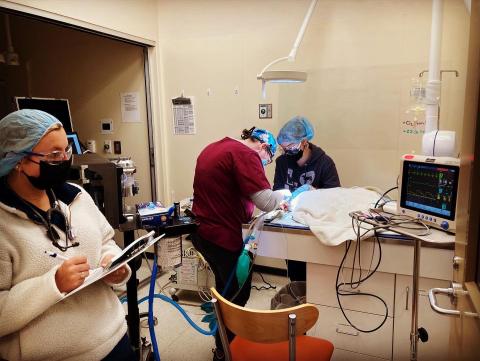
Why UNH Vet tech?
- We offer all the benefits of a small school (small class size, personal attention)with access to all that a state university can offer (support services, housing, dining, clubs, sports, activities, etc.).
- We believe in hands-on learning and start our students off working with animals in their first semester (see next FAQ).
- We offer students real-world training in our state-of-the-art teaching clinic right on campus.
- We offer students access to comprehensive large animal training with equine and dairy herds right on campus.
How much hands-on/live animal work do you offer?
- Students start working with animals in the first few weeks of their first semester. There is at least one hands-on/live animal class each semester. Seniors spend ½ day per week working with real patients in our teaching clinic and working in the medical department of local animal shelters. They also run an off-campus wellness clinic for underserved pets twice a month.
- Of course, there’s a lot of material to learn too, but we believe our students learn best by putting their knowledge into practice. You start working on gentle, relaxed animals as a freshman in various labs. In the teaching clinic, students perform all the duties legally allowed of vet techs. Here are just a few of the things you’ll do:
- Performing physical examinations and administering injections
- Taking blood samples
Running lab tests on blood, urine, and feces
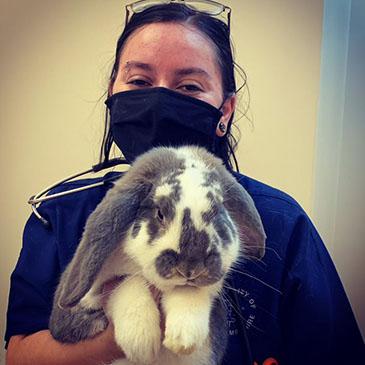
- Speaking to clients
- Administering and monitoring anesthesia
- Performing radiography
- Performing dental procedures
- The only things legally restricted to veterinarians are diagnosing disease, prescribing treatment, and performing surgery. Everything else is for you to do!
Can I get a bachelor’s degree in Veterinary Technology?
- Ours is a 2-year program that awards an associate degree.
- You can transfer to the UNH Animal Science program as a junior after completing our program and complete their program in just 2 more years. You basically get 2 degrees in 4 years!
Why would I want to go on to a bachelor's program?
- If you want to pursue veterinary graduate school, you would start that path through your bachelor’s program. UNH’s Animal Science and pre-vet programs are a well-known path to veterinary school.
- A bachelor’s degree could be useful if you decided to change careers in the future.
- You don’t need a bachelor’s degree to be a successful veterinary technician. You will not get better jobs or better pay as a veterinary technician with a bachelor’s degree.
- You can make this decision to continue as late as your final semester in our program so there’s no rush!
How successful are your graduates?
- 100% of our graduates who seek work as veterinary technicians are successful. The demand for veterinary technicians continues to grow and many practices are short-staffed. There are more job openings than there are qualified technicians across the country.
If you are not yet a UNH student, apply now:
Undergraduate Admissions Office
If you are currently a UNH student in another major:
You may apply to transfer into the Veterinary Technology program. It is recommended to begin the program in a Fall semester due to the required sequencing of courses.
A complete application includes:
- Change of Program Form
- A typed, double-spaced essay (maximum 500 words). The essay should address the following:
- Explain your reasons for applying to this program.
- How do you feel about your coursework and/or how your life experiences have prepared you for this program?
- What does being a Vet Tech mean to you?
- One or two letters of reference discussing your interpersonal and animal-related abilities. Each letter must be submitted in a sealed envelope signed across the back by the individual(s) who wrote the reference. Letters should address the following:
- Length of time the student has been known by the person writing, and in what capacity
- Academic ability
- Analytic ability
- Oral and written communication skills
- Interpersonal skills
- Animal interaction skills
Admission decisions are based on several factors, including:
- academic achievement (especially in animal science-related courses),
- the applicant’s understanding of veterinary technician responsibilities,
- evidence of an informed decision about entering the field, and
- references who can attest to the applicant’s academic potential for completing the program successfully and to the applicant’s personal qualities that relate to success in the animal health field.
A minimum cumulative GPA of 3.0 is recommended for application. All applicants will be notified via email of the decision regarding their application.
- Deadline for Fall admission: May 1st
- Deadline for Spring admission: Dec 1st
Direct any questions about the program or the application process to Mary Wiley.
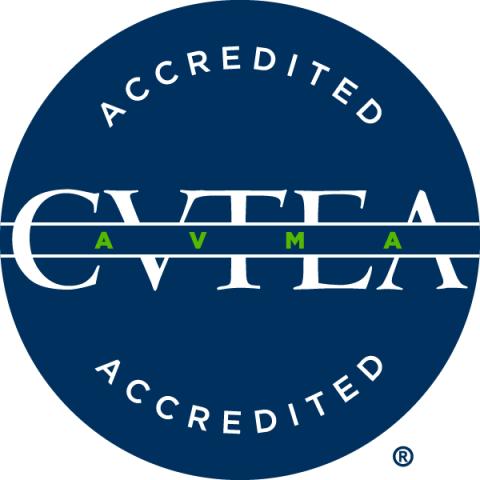
To become a certified veterinary technician (CVT) in NH, you must complete these steps:
- Graduate from an AVMA accredited program. (Like ours!)
- Pass the Veterinary Technician National Exam (VTNE).*
- Apply for certification from the NH Veterinary Technician Association (NHVTA).
- Keep your certification current by completing 12 hours of continuing education (CE), and paying the license fee each year.
Most states that offer credentialing require the first two steps. The organization where you apply for licensure and the CE requirements differs from state to state.
| *VTNE Results for January 1, 2022 - December 31, 2024 | |
|---|---|
| Number of first-time candidates that have taken the VTNE | 65 |
| Three-year VTNE pass percentage | 47% |
Why Become Certified?
NH and a few other states do not legally require certification, but it distinguishes you from those who have not completed the training and requirements. Many practices prefer to employ CVTs and usually pay more for that credential. If you intend to work outside New England, certification is critical, because most other states require it (37 of 50 states require certification). The certification process also helps to establish minimum ethical and educational standards for the profession.
Helpful links:
If you wish to continue beyond the 2-year associate degree in Veterinary Technology, you can transfer into the UNH Animal Science program and in just two more years, receive a bachelor’s degree. This articulation only applies to graduates of the UNH Vet Tech program. Students who transfer out of VTEC before graduation may not receive ANSC major credit for VTEC classes as described below.
Veterinary technology coursework transfers into the UNH Animal Science baccalaureate program as described below, making it possible to complete the Animal Science B.S. degree in 2 additional years of study. It is a simple process to transfer to the Animal Science program. In the final semester of the veterinary technology program, students complete the UNH Transfer Application found in Step 1 of the undergraduate admissions process. For students interested in pursuing graduate/veterinary school the pathway will require three additional years to fit in the required extra coursework.
Curriculum checklist for VTEC graduates transferring into ANSC as juniors
| VTEC courses | Counts for ANSC requirement: | Credits |
|---|---|---|
| AAS 428 Anatomy and Physiology of Domestic Animals | ANSC 512 Anatomy & Physiology | 4 |
| VTEC 424 Introduction to Veterinary Technology | ANSC 406 Careers in Animal Science | 1 |
| VTEC 430 Companion Animal Behavior and Handling | ANSC elective | 4 |
| VTEC 449 Clinical Animal Nursing Techniques | ANSC 421 Intro to Animal Science | 4 |
| VTEC 550 Clinical Animal Nursing Techniques II | ANSC experiential elective | 4 |
| VTEC 565 Pharmacology for Veterinary Technicians | ANSC 625 Animal Diseases | 4 |
| VTEC 575 Anesthesia and Surgical Assisting | ANSC elective | 4 |
| Recommended Discovery coursework | ||
| BIOL 528 Biostatistics | Quantitative Reasoning category | 4 |
| ENGL 401 First-year writing | Writing category | 4 |
| Social Science course | Social Science category | 4 |
| Total major and Discovery credits accepted: | 39 |
P.A.W.S stands for Pet Access to Wellness Services. The PAWS Veterinary Clinic offers low-cost veterinary care to qualifying pet owners during the academic year. We serve residents of the Dover Housing Authority and other qualifying low-income pet owners. Clients qualify by providing proof of some type of government assistance.
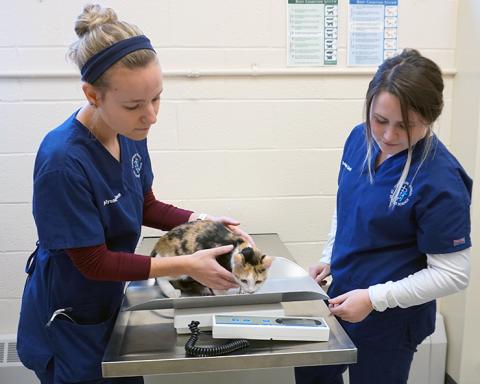
Referral Partner Animal Shelters
We have worked with many veterinarians and social service providers. Some of our closest partners include:
Related Links
- WMUR: Investigation underway after extremely emaciated dog found stumbling around NH neighborhood (Interview of UNH Alumna Jordan Daigle ‘17
- UNH Veterinary Clinic Makes Pet Ownership Possible: Lower-income pet owners now have access to affordable wellness services
- A Vet Clinic for Good: UNH’s on-campus clinic helps pets and owners in need
- Animal Ambition: Four vet tech students talk about the value of learning by doing
- Leader of the Pack: University’s veterinary technology program named one of the best
